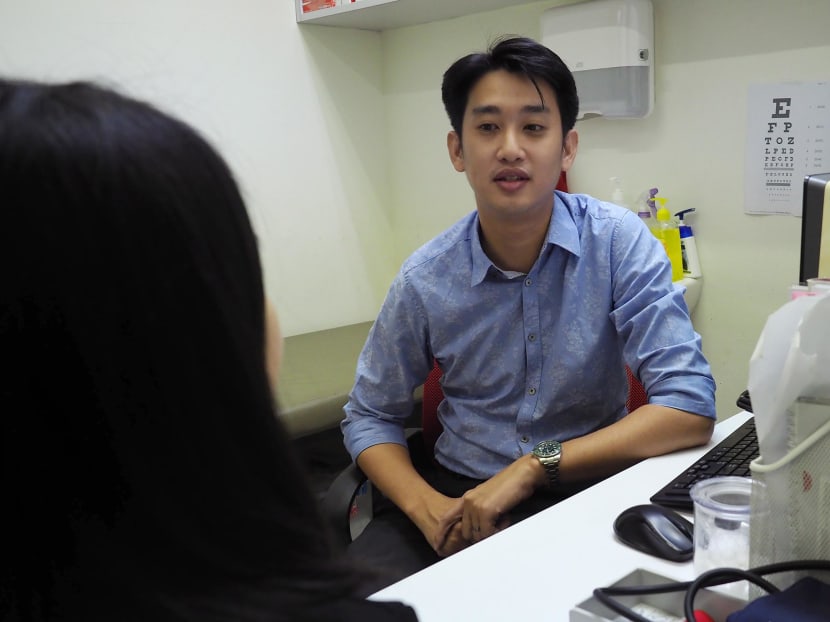Sunday Spotlight: Helped out of depression, singer wants to help others with mental issues
SINGAPORE – Wracked with back pain for two years, Ms Hashy Yusof grew increasingly anxious, much more so when she found herself barely able to walk or get out of bed. After some time, the 23-year-old became wheelchair-bound.

Ms Hashy Yusof turned to her fiancé Mr Marc Than not only for physical help but mental support after discovering that she had a tumour in her spine. He helped her deal with her post-operation depression and anxiety attacks. Photo: Raj Nadarajan/TODAY
SINGAPORE – Wracked with back pain for two years, Ms Hashy Yusof grew increasingly anxious, much more so when she found herself barely able to walk or get out of bed. After some time, the 23-year-old became wheelchair-bound.
It was only in the middle of last year that an MRI scan unearthed the root cause: She had a tumour on her spinal cord. While it could be surgically removed, doctors broke the bad news to her that she would almost certainly be paralysed after the operation and she would no longer be able to have children.
The prognosis hit her badly. She found herself slipping into depression. Yet, she suppressed her feelings, even to her family, because she did not want to trouble them.
“I just felt like a burden to everyone around me … I was sad all the time. At one point, I couldn’t take it and was pushing everyone away,” the marketing executive told TODAY.
The only person Ms Hashy would turn to was her fiancé Marc Than, 33. The pair met while they were contestants in the first season of local reality singing show The Final One, and had been dating for more than three years when the bad news struck.
“There was a period when she kept saying, “You need to leave me, I’m a burden.” … She was waking up in the middle of the night, texting me at 4am that she couldn’t sleep, that she was mentally distressed,” Mr Than said, putting his hand over Ms Hashy’s.
Seeing her in such a state spurred Mr Than to seek a second opinion on her condition, and a doctor gave Ms Hashy an 80 per cent chance of recovery from the operation. In late July last year, she went for surgery and doctors successfully removed half of the tumour in a 9-hour-long operation.
In two weeks, Ms Hashy was back on her feet.
But she sank into depression again and suffered anxiety attacks.
“I gained 13kg in a month from being on steroids and had mood swings, especially over simple tasks like taking a comb from the other side of the room,” she said.

She did not want to get professional help from a psychiatrist either, because she felt she did not “need it”. But she had Mr Than by her side all the while, supporting her through her dark moments.
Ms Hashy also eventually reached out to her parents, who helped her feel better about her mental struggles.
Now that she is better, she wants to spread the word on managing mental health. Next Saturday, the couple will perform in a concert as part of World Mental Health Day, which falls on Oct 10. The day aims to raise awareness of mental health issues around the world and mobilise efforts in support of mental health.
Having a loved one to turn to and opening up to someone can be exactly what those with mental health issues need, no matter how severe the sufferer thinks their condition is, said Dr Daniel Fung, Chairman Medical Board at the Institute of Mental Health (IMH).
He added that having mental health issues does not mean the end of the road either, as it is not a chronic, untreatable illness.
“(Mental illness) may be chronic, but diabetes is a chronic illness too, and we talk about it,” he pointed out. “We talk about leading a wholesome life – it (should be) the same thing for mental illness.”
Dr Fung said it was important that those with mental health issues talk about what they are going through but they may not, because they find it “embarrassing or shameful”.
Talking about what they are going through helps them “acknowledge the existence and validates the management of your illness”, he said.
Dr Joel Foo, a general practitioner whose clinic participates in the IMH’s Mental Health - GP Partnership Programme, said that he has seen more young people walking in to seek help for their mental health issues. Some, unwilling to open up to their loved ones, just want someone to talk to, he said. And while many of them require further evaluation by a psychiatrist, seeking out clinics like his can be a crucial first step, he added.

“It reduces the stigma of going to IMH for help, it’s less intimidating, and more convenient for them to go to a clinic near their place,” Dr Foo said.
Having a pillar of support could make a huge difference, Ms Hashy said. “I don’t think I could have gotten through what I did without Marc’s help,” she added.
Being able to perform at the Esplanade before her operation - her dream stage - was important for her, even if it was not entirely how she imagined it. She could not play the guitar as she did not have the stamina to hold it, and also had to perform sitting down.
“As much as I was very sad about it, I didn’t want to disappoint my family or friends … It was really difficult. I really wouldn’t have been able to do it if I didn’t have the support and people behind me to push me and remind that it’s not always about disappointing other people. It’s me first,” she said.
“Don’t be afraid to open up. People just want to help you. If you don’t let them help you, it can be detrimental to both you and them,” she added.











